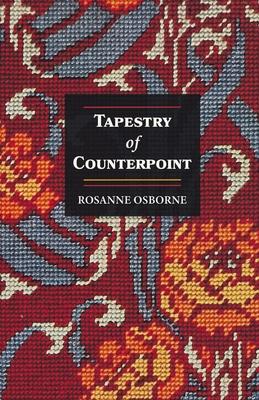When a snake appears in Tapestry of Counterpoint, it does so not as an emblem of evil, but whether as warning or Death's emissary or a second self is not clear. This suggests that Rosanne Osborne is no ordinary pastor; indeed, she's also a retired English professor and poet in the aftermath of Katrina, standing before "the mystery of being." Raised in rural Missouri, the poems' speaker has left for college in New Orleans during the sixties; a "fundamentalist zealot / from the heartland," she discovers "the freedom of doubt" while reading Paul Tillich. Now an aging woman, she is jolted physically while shoveling dirt to cover bulbs, an experience not unlike the one she experienced as a twelve-year-old bracing a ewe to help her mother with a breach birth, both incarnations of a sort. You'll find here not only a mind exerting a counter pull to the forces of gravity and also the earthy and sensual delight in figs and pomegranates, the mouth pleasure in saying "havarti" in anticipation of the first bite of a roast beef sub. Precisely because Tapestry of Counterpoint is shadowed by death and moments of doubt, reading it, I can't help but think of James Wright's "brilliant blue jay" that jumps up and down on a branch because it knows "that the branch will not break." Such faith is necessary to provide a "true account" of a long-life restlessness, an openness to change and uncertainty. Rosanne Osborne has brought to the page her whole self-body, mind, and spirit-to voice these earnest, wry, and wise poems.-Debra Kang Dean, author of Totem: America
Rosanne Osborne's first poetry collection, Tapestry of Counterpoint, deftly weaves together the experiences of her fascinating life. These poems reflect her personal and philosophical journey, enriched by the literary influences and poignant lessons gleaned from her tenure as both an English professor and Methodist pastor. I particularly loved reading poems that capture scenes from a Missouri childhood that were so vivid that I felt myself pulled back in time. When colts and lambs are born, or hunted raccoons tremble in trees, the inseparable alchemy of hope and despair occurs. Yet, unlike her parishioners who gather at a funeral, nervously avoiding the deceased in the coffin, she does not flinch nor look away from death. When the poet experiences Zugunruhe, her own nocturnal restlessness, she retraces the paths she has chosen. There are poems of intense personal scrutiny, while others celebrate simple joys, such as Havarti cheese or the tart crunch of pomegranate seeds. The reflections in this exquisite collection bring us to "remain at daybreak / to pile its stones." proclaiming all the ordinary moments that allow us to recognize the holy ground over which we too travel.-bg Thurston, author of The Many Lives of Cathouse Farm-Tales of a Rural Brothel
